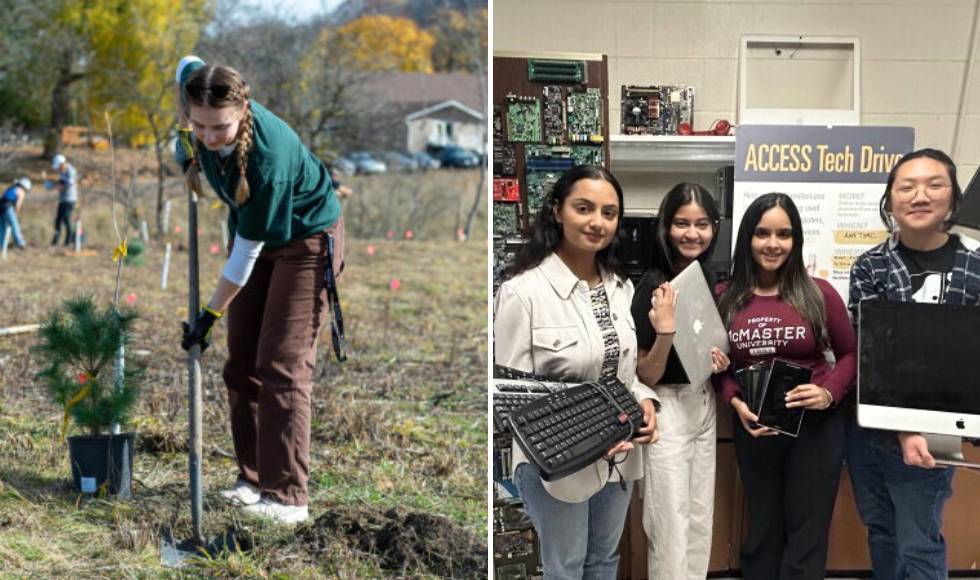Two student-run projects win 2023 Climate Change and Health – Innovation Award

The top prizes went to students who facilitated a community tree-planting event, and a group who helped in the collection and reuse of donated technology. (Photos credits: Peter Rukavina and Matt Clarke/McMaster University).
Two student-run projects have been recognized for their efforts to address complex sustainability challenges.
The projects, which grew out of experiential learning projects through McMaster’s Academic Sustainability Programs (ASP) Office, are the winners of the 2023 Climate Change and Health – Innovation Award.
The award, established in 2017, is intended to recognize students who have achieved excellence in creating an innovative solution that positively impacts climate change and health. It promotes interdisciplinary teamwork across faculties and fosters diverse and inclusive leadership.
Applicants are judged by an interdisciplinary committee of McMaster faculty members. First place winners receive $3,000, and the second-place winner is awarded $2,000.
Learn more about the 2023 winners below:
First Place – Growing the Carbon Sink Forest
A project that saw the facilitation of a community tree-planting event in at the McMaster Carbon Sink Forest took home the first prize.

The team helped facilitate the planting of 300 trees at the model forest, which serves as a research project, demonstration site and outdoor classroom.
The students involved in the project — Herleen Sambhi (Faculty of Humanities), Sama Hammeed and Abdullah Mumtaz (Faculty of Science) — partnered with the McMaster Centre for Climate Change (MCCC), Nature at McMaster, the Academic Sustainability Programs Office and Trees for Hamilton.
The tree planting contributed to the carbon sequestration capacity of the forest, as well as the biodiversity of the West Hamilton site.
The group was recognized for inspiring others to address climate change, and for the lasting impact their work will have. As the trees in the forest mature, they could significantly combat global warming by sequestering 14,400 pounds of carbon dioxide per year.
Second Place – ACCESS Tech Donors
A student project team that contributed to ACCESS Tech — a program where donations of used technology are distributed to Hamiltonians in need — took the second-place prize.
 The student team, Edward Kang (Engineering), Devanshi Patel, Sanjoli Saini and Mehakpreet Sandhu (Faculty of Science), investigated the motivations of people donating their used technology. Their insights will be used to increase donations and help future efforts to give electronics a second life with a new owner.
The student team, Edward Kang (Engineering), Devanshi Patel, Sanjoli Saini and Mehakpreet Sandhu (Faculty of Science), investigated the motivations of people donating their used technology. Their insights will be used to increase donations and help future efforts to give electronics a second life with a new owner.
The team’s efforts to create a positive, long-term impact on climate change by reducing emissions, conserving energy and fostering a circular economy was recognized by the judging committee.
Their findings will help communications around future ACCESS Tech events, and ensure these donated items get in the hands of those who need them.
Honourable Mention – Pedaling Together: Facilitating Cycle Hamilton’s AGM
The Pedaling Together team was recognized for working with local non-profit Cycle Hamilton to organize and facilitate their Annual General Meeting.
The student team — Anthony Magliaro (DeGroote School of Business), Olivia MacAskill, Sajroop Mann and Jelena Spalevic (Faculty of Science) — organized three cycle-friendly group rides as part of a wider effort to get Hamiltonians to embrace the green mode of transportation.
Their project not only advocated for greener transportation but also cultivated a resilient and connected community, inspiring a shift towards a healthier, more sustainable city.
Learn more about SUSTAIN projects in the Academic Sustainability Programs Office 2022/2023 Annual Report.


